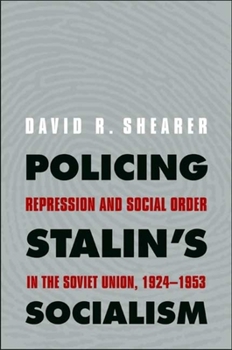Policing Stalin's Socialism: Repression and Social Order in the Soviet Union, 1924-1953
(Part of the Yale-Hoover Series on Authoritarian Regimes Series)
Policing Stalin's Socialism is one of the first books to emphasize the importance of social order repression by Stalin's Soviet regime in contrast to the traditional emphasis of historians on political repression. Based on extensive examination of new archival materials, David Shearer finds that most repression during the Stalinist dictatorship of the 1930s was against marginal social groups such as petty criminals, deviant youth, sectarians, and the unemployed and unproductive. It was because Soviet leaders regarded social disorder as more of a danger to the state than political opposition that they instituted a new form of class war to defend themselves against this perceived threat. Shearer details the workings of informant networks, police registration systems, and widespread police cleansing campaigns and surveillance systems used to monitor and control the population. Despite combined work of the political and civil police, these efforts to cleanse society failed; this failure set the stage for the massive purges that decimated the country in the late 1930s. In fact, Shearer argues, the "Great Terror" of 1937-1938 cannot be understood in isolation from the social purging campaigns of the early and mid-1930s.
Format:Paperback
Language:English
ISBN:0300149255
ISBN13:9780300149258
Release Date:September 2009
Publisher:Yale University Press
Length:536 Pages
Weight:1.70 lbs.
Dimensions:1.2" x 6.1" x 9.2"
Related Subjects
History Political Science Politics & Social Sciences Social Science Social SciencesCustomer Reviews
0 rating





